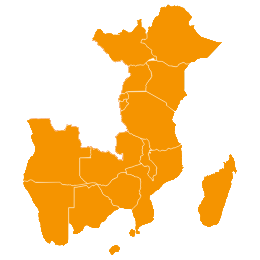Developing supply capacity for local animal health inputs for improved animal husbandry
“With the support of Mngcunube agents, among 5,700 farmers in one district between 2014 and 2016, sheep mortality rates fell from 18 per cent to between 4 and 6 per cent, and cow mortality rates fell from 20 per cent to between 2 and 11 per cent.”
BACKGROUND
In rural areas of developing countries, the potential value of livestock as assets for low-income farmers is severely reduced by poor animal health. Mngcunube provides farmers with basic husbandry practices and animal health care training.
WHAT’S INVOLVED
Advisory services
Farmers are advised on issues such as when and how to give treatment and how to identify animal health problems.
Employment opportunities
Members of hard-to-reach and at-risk communities are trained in good husbandry practices and basic animal health care and become Mngcunube agents.
EXPLORE THIS SOLUTION
Mngcunube offers:
- Advise on animal health issues.
- Business opportunities in remote areas.
- Decrease in animal mortality rates.

Countries involved
South Africa
Project dates
2014 - Present
Share this solution
Bookmark this solution
BookmarkShow Full Solution
Summary
Mngcunube, a not-for-profit organisation operating in South Africa, trains local agents as village link persons (VLPs) to bridge the gap in rural access to basic but vital animal health products that improve animal birth and survival rates. This approach is helping hard-to-reach smallholder famers improve household food security and generate income. At the same time, the organisation is mitigating the impacts of zoonotic and foodborne diseases on humans.
Challenge/Problem
In rural areas of developing countries, many poor families own livestock. However, the potential value of livestock as assets for low-income farmers is severely reduced by poor animal health, caused mainly by limited access to livestock medicines for basic animal health and advisory services. As a result, animals do not breed well, they produce poor-quality wool and mohair (in the case of sheep and goats) and they have a high death rate from avoidable health problems.
Accessing livestock medicines in deep rural areas can be difficult. Transmitting information on livestock production has rarely been a priority for centralised extension services in developing countries, and village shops have limited technical knowledge of what to stock and how to store it. Additionally, farmers may not know the medicines they need, and those who do may lack the money to travel to the nearest town. Sometimes, village stores will only stock large dosages, meaning that much of the medicine will go to waste if farmers have only a few animals and no way to store the rest of the medicine.
Addressing diseases of public health importance contributes to better health outcomes among rural communities, most of which own some form of livestock.
Solution
Mngcunube’s approach mainly involves training members of hard-to-reach and at-risk communities in good husbandry practices and basic animal health care. Activities include finding community members with a keen interest in livestock who can operate small businesses as Mngcunube agents. These people are trained to operate as village link persons (VLPs) providing animal health services.
VLPs give advice to farmers on issues such as when and how to give treatment and how to identify animal health problems. Each VLP covers about 20 villages, with households in most cases needing treatment for their livestock once a month. Mngcunube runs a VLP supply depot that centrally collects orders and delivers to VLPs.
The price is modest: the cost of treatment plus a small mark-up that enables VLPs to earn an income. This set-up favours VLPs who are conscientious and energetic, encouraging them to provide good service in order to attract and maintain their customers. Farmers pay for the VLP services.
Results
In data collected from among 5,700 farmers in one district between 2014 and 2016, sheep mortality rates fell from 18 per cent to between 4 and 6 per cent, and cow mortality rates fell from 20 per cent to between 2 and 11 per cent.
The results clearly show that Mngcunube’s approach can be highly rewarding for livestock owners, their families and the community-based entrepreneurs serving as VLPs. These results also have impacts along the value chain, as many diseases also have indirect costs, both upstream (such as the demand for feed) and downstream (such as retailing links).
Lessons Learned
While the project’s design is very simple, it requires tight management and monitoring to operate effectively. Implementing the system requires robust community participation and buy-in. South Africa’s national veterinary services have embraced the system, which has been a key part of the enabling environment.
There may be challenges in scaling Mngcunube’s practices. Poor infrastructure constrains access to mobile livestock communities, and it is difficult to maintain a reliable cold-chain system for livestock vaccines in the absence of reliable energy sources. Poor access to quality drugs and limited resources for maintaining service delivery are additional challenges. There may be limits on the extent to which the VLP system can be integrated into national veterinary service structures, too.
To operate smoothly and sustainably, it is necessary to institutionalize VLPs in order to regulate and standardize the approach.
Next Steps
Mngcunube considers the effectiveness of the VLP approach to be independently verified. The need therefore is to find ways of ensuring wider awareness and uptake while at the same time maintaining standards. Mngcunube will explore more sustainable cost-recovery mechanisms in service delivery to continue bridging gaps in access to quality inputs and field-based services.
Solution Image
Solution Additional Resources
Mngcunube websiteLast update: 22/09/2020
